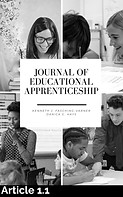The Journal of Education Apprenticeships (JEA) is a transformative dedicated space centered on innovations in practice, training, and scholarship for apprenticeships in education. JEA delves into the pivotal role apprenticeships play for educator candidates, educators, leaders, and those served in diverse education space. We invite submissions highlighting the perspectives of diverse education roles (e.g., teacher, leader, school counselor, school social worker, state-level administrator, supervisor) across PK-20 settings.
Using an open access approach, JEA seeks to dialogue about the intricate and dynamic aspects of apprenticeships in a timely manner and increase overall engagement with apprenticeships. We aim to foster conversation that transcends academic disciplines and applies diverse theoretical and methodological perspectives.
Scroll down for a special offer!
VOLUME 1

Informal science educator professional identity: Perceptions of NGSS, work with teachers, and the centrality of place
This paper presents the results of a survey
and interview study with informal science educators in a state in the U.S. Midwest.
Using a sociocultural framing of identity, we examined the values and positioning
of ISErs through two avenues: their work with teachers, and the role of place/content
in their work.

Lessons Learned in Building a sustainable and Meaningful cooperative Outreach Program
In the United States there is a growing sentiment that scientists conducting primary research with public funding should also be directly engaged in science education through outreach to the community and public schools



























